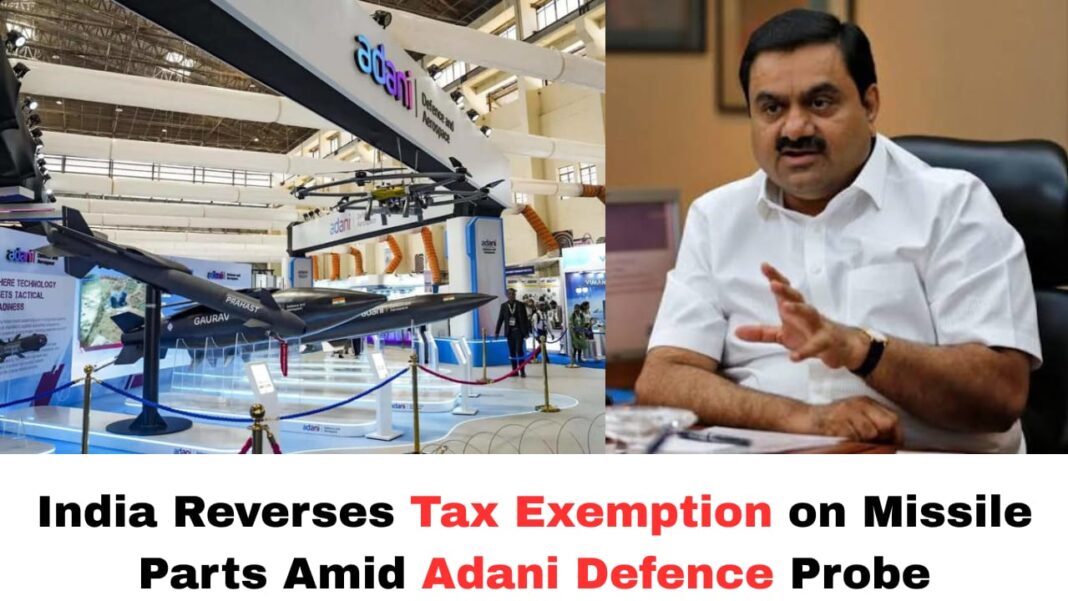Digital News Guru National Desk:
India Reverses Tax Exemption on Missile Parts
In a surprising policy reversal, the Indian government has withdrawn a recent exemption on import duties for missile parts — a move closely tied to the ongoing investigation into Adani Defence. The volte-face highlights how strategic sectors, corporate accountability, and defence procurement intersect in contemporary India.
The Policy U-Turn
In September 2025, the government issued a notification extending duty-free status to all missile parts imports — encompassing both long-range and short-range systems. The rationale was to support defence manufacturers, ease cost burdns, and boost indigenization efforts.

Yet, on October 9, a corrigendum was issued that struck out the word “missiles” from the exemption list. In effect, this removed the blanket relief for missile parts and restored the prior regime, under which only certain parts (not all) were eligible for exemption.
According to Krishan Arora, a partner at Grant Thornton Bharat, this correction reinstates the older framework where small-range missile parts were not specifically covered under import duty exemptions.
No explicit government explanation has been provided to date regarding the reasons behind the abrupt change.
The Adani Defence Inquiry
The backdrop to this policy reversal is a tax investigation into Adani Defence Systems & Technologies, a defence arm of the sprawling Adani Group.
According to sources and reviewed documents, authorities allege that Adani Defence misclassified imported parts for short-range missiles as parts for long-range missiles — the latter being eligible for duty exemptions. This misclassification, they claim, resulted in evasion of about 770 million (≈ USD 9 million) in import taxes.
The Directorate of Revenue Intelligence (DRI) initiated the probe in March 2025. Under standard practices, companies found liable in such cases must pay the tax owed plus a 100% penalty, which would amount to an additional ~USD 9 million in this instance.
The scale of the alleged evasion is nontrivial. Adani Defence’s revenue for 2024–25 was approximately USD 76 million, and the disputed amount reportedly constitutes over 10% of that. Moreover, more than half of the firm’s profit for that period is said to rest on the amounts under scrutiny.
Adani has stated that it has submitted clarifications and relevant documents, and considers the matter closed from its end. Nonetheless, sources say the company, at least in internal disclosures, may have acknowledged misclassification.

Since January 2024, Adani Defence has imported roughly USD 70 million worth of defence parts from countries such as Canada, Israel, and Russia.
Why the Reversal Matters
- Signal of Regulatory Firmness
The reversal underlines the government’s sensitivity to perceptions of favor or misuse of exemptions in strategic sectors. Defence is a high-stakes domain; policies that appear to favor one corporate player over others carry political and reputational risk.
- Uncertainty for Defence Firms
Frequent and abrupt policy changes introduce unpredictability for defence manufacturers that depend on imported components. Even if the initial exemption policy was well intentioned (to promote “Make in India” and lower costs), its sudden withdrawal underscores a fragile policy environment. This may discourage long-term investments or planning in defence production.
- Retroactive Exposure
Because the exemption was short-lived and reversed quickly, it does not retroactively absolve past imports. The ongoing investigation remains focused on prior fiscal actions. Companies cannot count on temporary policy shifts to shield earlier conduct.
- Corporate Governance & Reputation
Adani Group has in recent years come under multiple regulatory and political scrutiny in areas such as stock market practices, environmental compliance, and import regulations. This development adds another dimension to that portfolio of challenges. Even if the company is ultimately cleared, the perception of regulatory risk may influence investor sentiment and public trust.
- Policy Design Lessons
The episode reveals how blanket exemptions — without strong safeguards, rigorous oversight, or phased implementation — can expose the system to misclassification, abuse, or legal ambiguity. Any future tax concession in defence imports would require a more nuanced architecture and transparent criteria.

Open Questions & Forward Watch
- Why no explanation? The absence of a public rationale invites speculation. Was there internal bureaucratic pushback? Did intelligence or revenue agencies flag misuse?
- Will others face scrutiny? If Adani Defence is under microscope, other defence importers may also come under closer review.
- What about judicial recourse? The Adani camp may challenge pending claims, classifications, or penalties through appeals and dispute resolution — including in courts and tribunals.
- Longer-term policy stability: Will the government now be more cautious in granting blanket subsidies or exemptions in strategic sectors?
- Impact on domestic manufacturing: Does the reversal hamper ambitions of domestic defence production, or will it spur efforts to localize more supply chains?
The reversal of the missile-parts exemption is more than a narrow tax adjustment. It sits at the intersection of defence strategy, corporate accountability, policy credibility, and state-industry relationships. It demonstrates that in sectors touching upon national security, regulatory discretion is likely to be tightly scrutinized — and exceptions granted even with good intentions may be rolled back if they invite controversy or appear to confer unfair advantage.
You May Also Read: BJP Releases First 71 Candidates for Bihar Elections 2025








